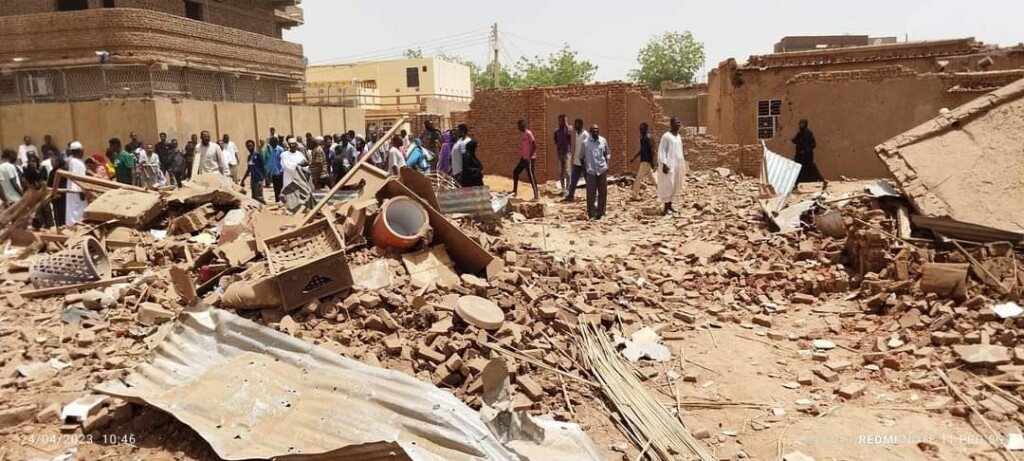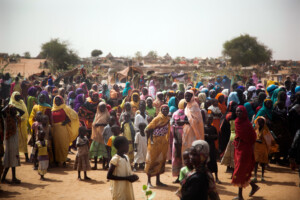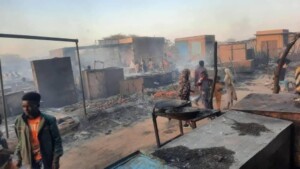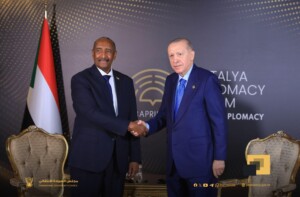First responders: Sudan humanitarian situation dire, ‘healthcare system days from collapse’

Destruction in south Khartoum after the Kalakala neighbourhood was bombed in April, a centre of resistance to military rule and a destination for many migrants and refugees (File photo: social media)
KHARTOUM –
A group of Sudanese first responders to the humanitarian crisis in Sudan, have appealed to the representatives of the Trilateral Mechanism, AU, UN, IGAD, Troika, Quad and other envoys meeting in the Ethiopian capital Addis Ababa to discuss the crisis in Sudan today, in an open letter outlining the growing humanitarian catastrophe in the country. The first responders also welcome the UN Secretary-General’s decision to dispatch the Emergency Relief Coordinator to Sudan.
In the letter to the Addis delegates, the group highlights that the fighting that erupted across Sudan on April 15 between the Rapid Support Forces (RSF) and the Sudanese Armed Forces (SAF) has had a devastating impact on civilian lives and infrastructure. “The worst impacted city is the capital Khartoum, where the UN has reported over 500 casualties and 4,000 wounded. The figures are mounting by the hour and probably a significant undercount given the number of victims it is not possible to count in the chaos,” the letter says.
“In this context, we draw your attention to the dire humanitarian situation. The healthcare system is a few days away from collapsing. Two-thirds of the hospitals in Khartoum are no longer operational. This lack of infrastructure leaves many victims – those wounded at home, pregnant women, the elderly, people with special needs, and patients in need of long-term maintenance care (for example dialysis) unable to receive life-saving health assistance. Medical supply chains are obstructed and supplies are scarce. Disruptions in the provision of water and electricity further impeded the ability of these facilities to function. Hundreds of medical staff have fled, and over a dozen have been killed,” the letter says.
The first responders lament that “critical civilian infrastructure, including water and electricity, has been severely damaged, leaving hundreds of thousands, in particular, in Khartoum North, without access to running water. The electricity supply is intermittent.”
‘Cities and towns have come to a complete standstill due to the violence’
Due to the violence, cities and towns have come to a complete standstill, the first responders say. “Millions of civilians remain caught in the crossfire, as the fighting takes place amidst densely populated neighbourhoods People are not able to access markets, jobs, banks, and pharmacies. Critical food and fuel stocks are rapidly depleting. People are fleeing Khartoum to neighbouring towns, which are ill-equipped to handle the needs of such a rapidly expanding population. This will likely lead to further deterioration of living conditions among both the internally displaced and host communities.”
They emphasise that tens of thousands have fled Sudan to neighbouring countries including, Chad, Egypt, Ethiopia, and South Sudan. The land border crossings to Egypt are heavily congested. Children, elderly, people with special needs wait for days inside buses before being able to cross. There are limited food, water, and medical services in the crossing points.
“International efforts to secure a ceasefire have faltered. In the meantime, the international community has evacuated diplomatic staff and citizens, and the remaining UN presence has relocated to Port Sudan. Relief efforts are not reaching many of those in need.
“We welcome the African Union’s efforts to mediate a solution to the crisis. We call on the AU and the mediation team to immediately travel to Khartoum and bring the fighting parties to the negotiation table to mediate a humanitarian ceasefire that enables a return to a political process that delivers a broad-based, civilian constitutional order in Sudan.
“We also welcome the UN Secretary-General’s decision to dispatch the Emergency Relief Coordinator to Sudan.”
The letter calls on the international actors gathered in Addis and others to immediately and urgently call on the Sudanese fighting parties to immediately cease hostilities by the parties, and uphold of their international humanitarian and human rights law obligations to protect medical facilities, staff, and critical civilian infrastructure.
‘Establish safe corridors for civilians to facilitate relief and evacuate those most in need to safer areas from fighting zones…’
It also calls on the delegates to work with humanitarian actors, including the International Red Cross/Red Crescent Movement to establish safe corridors for civilians to facilitate relief and evacuate those most in need to safer areas from fighting zones. “The corridors should also include routes for civilians to exit the worst impacted parts of Khartoum.”
- Guarantee safe passage for humanitarian workers to provide assistance to those most in need; and for civilians to reach help. This should include guarantees of safe and unimpeded access for medical personnel to locations where they are needed and of the wounded and those with other medical needs to health care facilities, and to ensure dignified burials of the deceased.
- Restore key supply chains to bring critical supplies including medicine, fuel, food, etc, into the cities.
- Ensure safe passage for government of Sudan electric and water/sanitation teams to repair water and electricity plants destroyed across Sudan, in particular in Khartoum North,
- Scale-up humanitarian assistance provision across Sudan, in particular Khartoum,
- Hand over control to the United Nations at least one operational airport so that humanitarian supplies can be received in Khartoum.
The first responders call on neighbouring countries to:
- Immediately open their land borders for those fleeing the conflict;
- Apply international refugee law and best practices to ensure the protection of those who are fleeing.
They call on the United Nations:
- To scale up its operational presence in Khartoum, including by setting up an operational cell;
- Monitor, document, and investigate human rights violations and abuses.
- Combat hate space and misinformation.
They call on the United Nations High Commission on Refugees (UNHCR) to
- establish support on the land border crossing points to facilitate Sudanese entry;
- advocate strongly with countries receiving Sudanese refugees for the implementation of international best practices to ensure that Sudanese fleeing conflict receive the highest possible level of protection.
In conclusion, the writers call on all parties gathered in Addis to coordinate together and with other relevant actors to ensure that these messages are delivered with one voice.
WFP to lift suspension
In a statement via social media this morning, UN World Food Programme chief Cindy McCain says that “as the crisis in Sudan pushes millions into hunger, the WFP is immediately lifting the temporary suspension put in place after the tragic deaths of our team members. WFP is rapidly resuming our programmes to provide the life-saving assistance that many so desperately need right now.”
Three WFP employees died, and two more were injured on April 17, in the early stages of the current escalation, when SAF and RSF troops clashed at a military base in Kabkabiya, North Darfur. At the time, a “horrified” WFP confirmed the deaths is a statement responding to questions from Radio Dabanga, and condemned the deadly shooting. The WFP spokesman called on “all sides in Sudan to respect the neutrality of humanitarian workers in Sudan whose role is to assist all sides in this crisis”.











 and then
and then